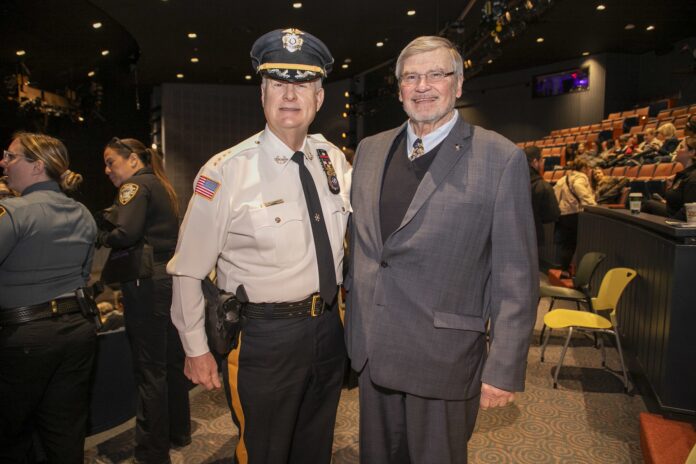Statewide Symposium at CCM Unites Law Enforcement and Community Partners
Morris County Commissioner Director Tayfun Selen joined Sheriff James M. Gannon and Prosecutor Robert J. Carroll, County College of Morris (CCM) President Dr. Anthony J. Iacono and many others today at CCM to mark the 8th anniversary of Hope One, the sheriff’s mobile outreach program that has become a national model for combating the opioid epidemic.
The event brought together nearly 200 law enforcement officers, first responders and community partners from across New Jersey to share ideas, information and best practices to address drug addiction and substance abuse in the community. The symposium also highlighted key milestones of both Hope One and the Hope Hub, a collaborative initiative that has intervened in more than 650 crisis situations since its launch four years ago.
“I am honored to celebrate eight years of Hope One, a lifesaving initiative that has helped countless individuals access care, support and a path to recovery,” said Director Selen. “Hope One thrives because of partnerships, and we remain committed to building on its success.”
He underscored the county’s ongoing commitment to supporting initiatives like Hope One, noting that the Commissioners have approved nearly $4 million in grant-in-aid funding to sustain 76 critical human services programs throughout the county in 2025.
View Photos from the Hope One Symposium

According to Det. Sgt. First Class Brian J. Kruzel of the New Jersey State Police Drug Monitoring Initiative, fatal drug overdoses have decreased by 50% statewide, with an average of fewer than three overdose deaths per day this year compared to nearly six per day at this time last year. Overall, suspected drug-related deaths dropped 30 percent to 1,803 in 2024 versus 2023. If the downward trend continues through 2025, projections estimate approximately 1,080 deaths, marking an additional 40 percent decrease. Nationally, overdose fatalities have only begun to decline slightly.
Although overdose deaths continue to persist, Det. Sgt. Kruzel credited the improvement to increased Naloxone (Narcan) deployment and expanded access to treatment — efforts bolstered by initiatives like Hope One.
“There is no secret that across America and beyond, this opioid epidemic was happening, and we wanted to make a difference. So, what do we need to do? We need to focus on the at-risk population, and the second and final piece is bringing services to them. That’s it; it’s not complicated,” said Sheriff Gannon.
Hope One’s success is driven by its mobile outreach model, which brings trained professionals directly into Morris County communities to provide critical support for individuals and families affected by addiction and substance abuse. The team offers free Naloxone education, training and kits to family members and friends of those struggling with addiction. The Sheriff’s Office, in partnership with the Morris County Department of Human Services, the Mental Health Association of Morris & Essex Counties (MHA) and the Center for Addiction Recovery Education and Success (CARES), staffs the unit with a plain clothes sheriff’s officer, a certified peer recovery specialist and a mental health professional.
Since its inception, the program has made more than 56,000 community contacts and trained more than 11,000 people in the use of Narcan.
“One thing I’ve learned in my career is that it will never be possible to investigate, arrest, charge, prosecute, and convict everyone involved in this type of activity. These are perennial challenges,” said Prosecutor Carroll. “When it comes to drug addiction and mental health crises, we are seeing improvements nationwide. It’s looking up because of the success of unified programs such as Hope One, Hope Hub, Community Connections, and the new ARRIVE Together program. Law enforcement will deal with the drug-dealing predators who profit from addicting our citizens.”

In 2023, the Morris County Prosecutor’s Office, in partnership with the MHA, launched the ARRIVE Together program (Alternative Responses to Reduce Instances of Violence & Escalation) in coordination with local police departments. The initiative pairs mental health counselors with police on certain emergency calls to assist law enforcement in de-escalating situations, such as stand-offs or tense encounters, by providing support to individuals in crisis. The program aims to improve the safety of both the community and responding officers and is funded through a statewide grant.
The Community Connections program is a collaboration among the Sheriff’s Office, the Morris County Prosecutor’s Office, and the New Jersey Administrative Office of the Courts. The program connects incarcerated individuals and those involved in the criminal justice system to essential services that support their recovery from substance use and mental health disorders.
During the event, several individuals were honored for their contributions: Bob Davison, CEO of MHA; Madine Despeine-Udoh, MHA Director of Self-Help, Advocacy, and Education; and Al Shurdom, Coordinator of Self-Help, Advocacy, and Education. Sean Abline received the Hope Hub’s Recovery Recognition Award. Presentations were also made by Dr. Nicole Thomas, psychiatrist with Morristown Medical Center, and Samantha Neville and Vito Andrisani of Passaic County Human Services.
The event celebrated the expansion of the Hope One model beyond Morris County. Ten other New Jersey counties — Atlantic, Bergen, Burlington, Cape May, Cumberland, Essex (City of Newark), Hunterdon, Monmouth, Passaic and Warren — have launched their own mobile outreach programs based on Morris County’s pioneering initiative.
To learn more about the Hope One program, visit the Official Website of Morris County, N.J.
Photo 1: Commissioner Director Tayfun Selen speaking at the Hope One symposium.
Photo 2: (l-r) Morris County Sheriff James M. Gannon and Morris County Prosecutor Robert J. Carroll.
Photo 3: A table of awards presented at Hope One’s 8th Anniversary.













